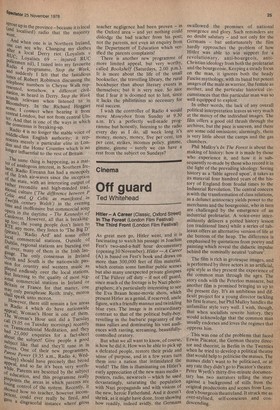Radio
Breaking-up
Mary Kenny
The coming changes on the BBC racli° wavelengths (23 November) really are extremely significant; their signifiearic,ne might be pondered by those who care study cultural patterns. In a way they aref a sign of the break-up of a consensus, ° a cultural norm that has long been taken for granted, and that now no Wager exists. Once upon a time the Home Service, now Radio 4, could he taken tQf represent the broad middle view °t middle-class Britain, intelligent if intellectual, sane, balanced and reliautp-c Its character could be taken for grall7 in the same way as it could be taken 05 granted that most university graduareh spoke French, read a literary weekly ate as the Spectator and took a illor°7 newspaper. None of these things is matically true any more: I have spent ,e , last two months between London, 01.1'„ lin, Belfast and Derry and I have bee„," really struck by how little intellectua l: common ground there is these days ate ween, even, say, the university gradri.t class. It all ratifies my theoryt'lriv increased telecommunications aeratid make people more insular, less interest' in the oustide world. Thirty years ag°' the English middle classes knew far 110Are about European politics than they rf, today, for all the ballyhoo about.
Common Market. , I In Northern Ireland, for examPe' 4 scoured the province to find a Radi° d listener. Finally, I found one, an agea Protestant spinster sitting next to me °11 e bus. Oh yes, she cooed, she did so 1cW Douglas Stuart on The World Tonight; making the old joke that she would nevvee go to bed without Mr Stuart. And si'd always listened to Alistair Cooke, an t The Countryside in Winter. But the of Ulster, so far as I could tell, is scarce' aware that Radio 4 is there. What theZ listen to is Radio Ulster (the local 1:313 service) and Radio Downtown, the commercial station. And there is a whole Ow batch of local stations just about t° Sprout up in the province – because it is local (and localised) radio that the majority Want.
And when one is in Northern Ireland, me can see why. Changing my clothes after a local Derry riot (Loyalists v 111,JC; Loyalists 69 – injured RUC Ps°1leemen nil), I tuned into my favourite Radio 4 programme, Stop the Week, and suddenly I felt that the fastidious tones of Robert Robinson discussing the telephone numbers in Cheyne Walk represented, somehow, a different civilisation, as heard in Deny. Stop the Week sounds relevant when listened to in Bloomsbury. In the Richard Hoggart sense, I connect when hearing it from central London, but not from central Ulste, r. And that is one of the ways in which the consensus is breaking-up. Radio 4 is no longer the stable voice of middle-class English authority; it represents merely merely a particular elite in Lonr°n and the Home Counties which is no Tiger influential to the rest of Britain.
The same thing is happening, as a mater of analogous interest, in Southern Ire'and. Radio Eireann has had a monoPolY of the Irish air-waves since the inception of the state, with an interesting output of t'ather recondite and high-minded trad itional culture (`The difference between P Celtic and Q Celtic as manifested in ,T.welfth century Welsh') in the evening 'me and inoffensive but commercial soap °Pera in the daytime – The Kennedys of Castleross. However, all that isbreakingabil) too; the young people don't listen to "kTE any more, they listen to 'The Big 13' Pirate), 'Radio Ard' and some other ;.;cal commercial stations. Outside of "ahlin, regional stations are bursting out all over, many of them in the Irish lanigvaage. The only consensus in Ireland orth and South is the nationwide passion for country and western music as Rlayed endlessly over the local stations. ut listening to the quality of most reg,1°nal commercial stations in Ireland or uritain or France for that matter, one 'nay Only only paraphrase Reith: truly, moron au speak unto moron. . However, there still remain a few areas in Radio 4 which do have nationwide ,aPPeal; Woman's Hour is one of them. ne Woman's Hour unit did a Tuesday call (9.05 on Tuesday mornings) recentlY °Lo Transcendental Meditation, and they `iad 25,000 enquiries for a fact-sheet about the subject! Give people a good drsubject like that and they'll tune in in °ves. One of their new programmes, uarent Power (9.35 a.m., Radio 4, WedliesdaY) should have precisely that broad appeal, and so far it's been very worthWhile. Parents are besotted by the subject of education, and this programme really FinPoints the areas in which parents are osing control of the system. Recently, it Showed how no teacher, however incomPetent, could ever really be fired, and gave a disgraceful instance where gross teacher negligence, had been proven – in the Oxford area – and yet nothing could dislodge the bad teacher from his post; not the parents, not even an enquiry from the Department of Education which verified the parents complaints! There is another new programme of , more limited appeal, but very worthy, called Bookshelf (Saturdays, 2.00 p.m.). It is more about the life of the small bookseller, the travelling library, the rural bookbuyer than about literary events in themselves; but it is very nice. So nice that I fear it is doomed not to last, since it lacks the philistinism so necessary for real success. I wish the controller of Radio 4 would move Moneybox from Sunday at 9.30 a.m. It's a perfectly well-made programme but honestly, listening to the radio every day as I do, all week long it's money, money, money, five per cent, ten per cent, strikes, incomes policy, gimme, gimme, gimme – surely we can have a rest from the subject on Sundays?



































 Previous page
Previous page